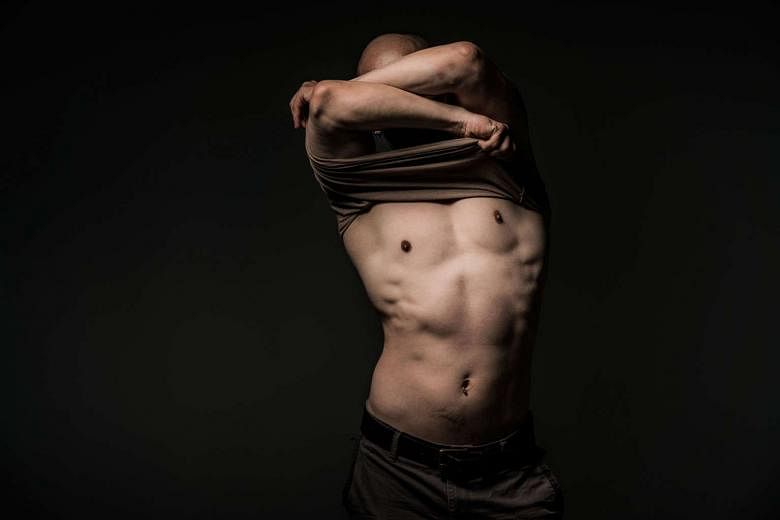The M1 Singapore Fringe Festival this month dropped two shows from its line-up for January rather than cut what the Info-Communications Media Development Authority (IMDA) called "excessive nudity".
The news raises talking points about censorship versus social norms as well as the limits of artistic expression here.
The shows denied a rating - which means they cannot be performed here - are Naked Ladies by Canadian artist Thea Fitz-James and Undressing Room by Singaporean dancer Ming Poon. Naked Ladies is a performance lecture about the female body. Undressing Room has a dancer and a ticket holder undress each other in private, in an attempt to relate to each other without the "protective skin" of clothes.
IMDA said this about the works: "The performances had excessive nudity which included scenes of audience-participants stripping naked, and graphic depictions of exposed genitalia."
This was not enough explanation for an influential network of artists here named Arts Engage. It issued an open letter questioning IMDA's grounds for censoring both works, adding that nudity is a time-honoured means of artistic expression.
The authorities responded with more details, such as the fact that Naked Ladies had a scene where the performer inserts a finger into her private parts. The organisers of the Fringe Festival maintained that both works attempt to distinguish nudity from sexualised connotations.

The artists were willing to change the works and resubmit them for classification, but organisers said that this would compromise the artistic integrity of both works. Instead, organisers cut both works from the programme.
The Fringe Festival case shows how difficult it can be for artists trying to understand what is permissible here. Guidelines to the Arts Entertainment Classification Code say that when classifying arts entertainment, "flexibility can be given for exploration of mature content" depending on its artistic and educational merit. The extent of this flexibility is difficult to judge.
The Fringe Festival, started by theatre troupe The Necessary Stage in 2005, is known for pushing boundaries. That is the point. In 2012, the festival was even allowed to restage a performance deemed obscene in 1993. Under an R21 rating, Loo Zihan performed Cane, his version of Josef Ng's Brother Cane, where Ng had turned his back to the audience and snipped his own pubic hair.
The Fringe Festival's theme for next year is Art & Skin, and will feature works that "explicitly explore humanity in its vulnerability and closeness", according to the programme booklet.
A case could be made for Naked Ladies, given the example of Cane and that the arts classification guidelines say "non-excessive portrayal of full male and female nudity, including exposure of genitalia, in a non-sexual context" is allowed in works with an R18 rating. A case was clearly successfully made against the work but the full extent of the discussion is unknown. This worries those who fear more stringent censorship here.
In contrast, IMDA's discussions on films are made much clearer. The IMDA website has case studies on controversial films such as Singaporean film-maker Ken Kwek's Sex. Violence. Family Values. In it, a character uttered racial slurs against Indians. IMDA brought in a community advisory panel, the Films Consultative Panel. A cross-section of Singaporeans were consulted. Twenty out of 24 panellists wanted the film to be denied a rating entirely. A compromise was achieved by muting the slurs and replacing them with music before the film was screened here in 2013.There are no similar case studies about theatre or visual art on the website.
When considering controversial works, IMDA brings in the Arts Consultative Panel of 40 housewives, working professionals, educators and artists. However, the panel's feedback is given only to the body applying for a licence, in a face-to-face meeting. There is no public document that explains to other applicants for a performance licence just what the flashpoints are and how they can negotiate.
The arts community fears that some groups in society are growing more intolerant and less inclusive. They ask: Why is it that when people are challenged by a work of theatre, they write to the authorities alone and not also to the artists or festival organisers?
IMDA denied Naked Ladies and Undressing Room a rating soon after a Facebook page called Singaporeans Defending Marriage And Family compared the shows to "a solicitation for a public sex act". (The authority says this did not influence its actions in the Fringe Festival case.)
Artists are not only worried about external pressure on IMDA - they want their detractors to engage with them directly. Theatre is, after all, made to communicate.
There are merits to letting the authorities - secular, neutral - be the arbiter of disputes in a multiracial, multi-religious society. But too much of this, and we have a society divided into inflexible pockets of belief, connected only through the medium of an office where one pocket or another registers a complaint.
Singaporeans need to talk to each other directly about what really matters to them.
Art has stimulated such discussions in the past. Take the Singapore Repertory Theatre's just-concluded run of the Pulitzer-Prize-winning play Disgraced. Disgraced is about post-9/11 America. Long bouts of hate speech against Islam make it discomfiting viewing. The play received an R18 rating from IMDA, on condition the troupe also had discussions with the audience after the show.
During the post-show dialogue attended by this reviewer, Muslims and non-Muslims had a respectful discussion on prejudice, anti-Islamic sentiment and coping with both.
Could a work like Naked Ladies provoke discussion on the anxiety felt when misogyny is encountered? Since the artists were prepared to change the shows, could the organisers have accommodated such adaptations?
During the Singapore International Festival of Arts earlier this year, a play usually performed by children for audiences aged 12 and over was given an R18 rating, prompting an outcry from the creator and festival organisers. Five Easy Pieces was partly developed to help children grapple with news headlines in Belgium over the case of sex criminal Marc Dutroux. Educational in Europe, but in Singapore, the mature topic of paedophilia meant an R18 rating.
Despite organisers' disappointment over the rating, the show was staged anyway. This allowed parents in the audience to judge for themselves whether or not the play would have been appropriate for children. This may have made it easier for other challenging works for young adults to run here in the future.
The discussion over the Fringe Festival shows need not stop now that they have been cancelled. It can be made productive.
The Necessary Stage has said it is willing to engage its detractors in conversation, in a dialogue where both sides air grievances and seek common ground. Some neutral body could help facilitate this.
Reaching out to the other in the hope of understanding - that is surely what an enlightened society is about.
Correction note: A previous version of the article stated that Disgraced received an M18 rating instead of an R18 rating. This has been corrected.


